涉及让步状语从句的五类倒装句
初中英语知识点归纳让步状语从句的引导词和结构

初中英语知识点归纳让步状语从句的引导词和结构引导词:1. Although (尽管)2. Even though (即使)3. Though (虽然)4. Despite (尽管)5. In spite of (尽管)结构:让步状语从句在句子中起到让步、转折的作用,常常出现在主句之前或之后。
1. Although/Even though/Though + 从句, + 主句例如:Although it was raining, we still went for a walk.尽管下雨,我们还是去散了个步。
2. 主句 + although/though + 从句例如:He failed the exam, although he studied hard.虽然他学习很努力,但还是考砸了。
3. Despite/In spite of + 名词/动名词/代词, + 从句例如:Despite the heavy rain, they managed to finish the race.尽管下着大雨,他们还是成功完成了比赛。
4. 从句 + despite/in spite of + 名词/动名词/代词例如:She passed the test, despite the fact that she didn't study much.尽管她没怎么学习,她还是通过了考试。
5. In spite of the fact that + 从句, + 主句例如:In spite of the fact that she was tired, she continued working.尽管她很累,她还是继续工作。
6. Though + 倒装句例如:Though tired they were, they still kept going.尽管他们很疲惫,他们还是坚持下去。
7. However + adj/adv, + 句子例如:However difficult the task is, we will do our best.无论任务多么困难,我们会尽力而为。
英语倒装句详解
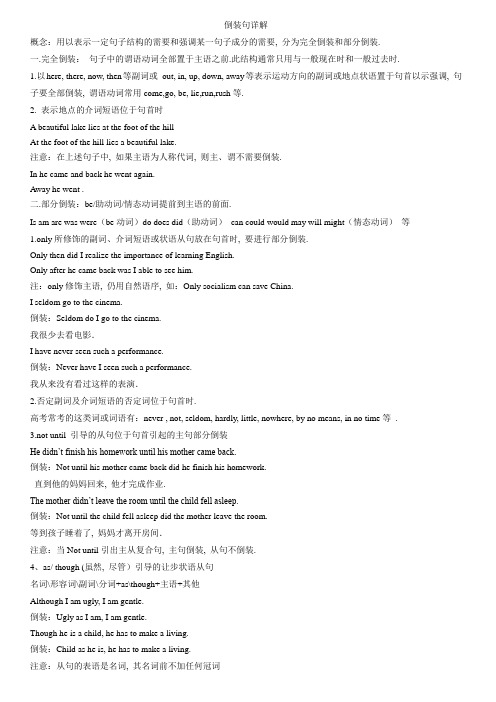
倒装句详解概念:用以表示一定句子结构的需要和强调某一句子成分的需要, 分为完全倒装和部分倒装.一.完全倒装:句子中的谓语动词全部置于主语之前.此结构通常只用与一般现在时和一般过去时.1.以here, there, now, then等副词或out, in, up, down, away等表示运动方向的副词或地点状语置于句首以示强调, 句子要全部倒装, 谓语动词常用come,go, be, lie,run,rush等.2. 表示地点的介词短语位于句首时A beautiful lake lies at the foot of the hillAt the foot of the hill lies a beautiful lake.注意:在上述句子中, 如果主语为人称代词, 则主、谓不需要倒装.In he came and back he went again.Away he went .二.部分倒装:be/助动词/情态动词提前到主语的前面.Is am are was were(be动词)do does did(助动词)can could would may will might(情态动词)等1.only所修饰的副词、介词短语或状语从句放在句首时, 要进行部分倒装.Only then did I realize the importance of learning English.Only after he came back was I able to see him.注:only修饰主语, 仍用自然语序, 如:Only socialism can save China.I seldom go to the cinema.倒装:Seldom do I go to the cinema.我很少去看电影.I have never seen such a performance.倒装:Never have I seen such a performance.我从来没有看过这样的表演.2.否定副词及介词短语的否定词位于句首时.高考常考的这类词或词语有:never , not, seldom, hardly, little, nowhere, by no means, in no time等.3.not until 引导的从句位于句首引起的主句部分倒装He didn’t finish his homework until his mother came back.倒装:Not until his mother came back did he finish his homework.直到他的妈妈回来, 他才完成作业.The mother didn’t leave the room until the child fell asleep.倒装:Not until the child fell asleep did the mother leave the room.等到孩子睡着了, 妈妈才离开房间.注意:当Not until引出主从复合句, 主句倒装, 从句不倒装.4、as/ though (虽然, 尽管)引导的让步状语从句名词\形容词\副词\分词+as\though+主语+其他Although I am ugly, I am gentle.倒装:Ugly as I am, I am gentle.Though he is a child, he has to make a living.倒装:Child as he is, he has to make a living.注意:从句的表语是名词, 其名词前不加任何冠词5.用于so nor neither 开头的句子A、So +be/助动词/情态动词+主语某人也是如此Nor/neither +be/助动词/情态动词+主语某人也不是如此1). 他喜欢读书, 我也是.He likes reading very much. So do I .2). 我从来没有去过广州大学, 他也是.I have never been to Guangzhou University, neither/ nor has he.Betty is a nice girl. So she isB、So +主语+be/助动词/情态动词某人确实如此6.在hardly/scarcely/…when;no sooner…than; not only … but also;so...that; such…that 的倒装句中, 前倒后不倒. hardly/scarcely/ no sooner后句子的谓语用had done, when/than后句子的谓语用一般过去时(1) Hardly / Scarcely had he fallen asleep when a loud knock at the door awaked him.(2) No sooner had I reached the station than train moved.(3) Not only is he interested in football but also he plays it well.(4) So hard does he work that he has made great progress in English.7. If 虚拟条件从句中.从句有(were/should/had)1)If I were you, I would work hard. 倒装:Were I you, I would work hard.2) If it should rain tomorrow, we would put off our meeting.倒装: Should it rain tomorrow, we would put off our meeting.3)If he had followed my advice, he would have succeeded.倒装:Had he followed my advice, he would have succeeded.8.May置句首, 表示祝愿.May you succeed.祝你成功!补充知识1.全部倒装全部倒装是只将句子中的谓语动词全部置于主语之前.此结构通常只用于一般现在时和一般过去时.常见的结构有:1)here, there, now, then, thus等副词置于句首, 谓语动词常用be, come, go, lie, run等表示来去或状态的动词.Then came the chairman. 那时总裁来了.Here is your letter. 你的信.2)表示运动方向的副词或地点状语置于句首, 谓语表示运动的动词.Out rushed a missile from under the bomber. 轰炸机肚底下窜出一枚导弹.Ahead sat an old woman. 前面坐着一个老妪.注意:上述全部倒装的句型结构的主语必须是名词, 如果主语是人称代词则不能完全倒装.Here he comes. 他来了.Away they went. 他们走开了.2.部分倒装部分倒装是指将谓语的一部分如助动词或情态倒装至主语之前.如果句子的谓语没有助动词或情态动词, 则需添加助动词do, does或did, 并将其置于主语之前.1.句首为否定或半否定的词语, 如no, not, never, seldom, little, hardly, at no time决不, in no way, not until… 等. Never have I seen such a performance. 从未见过如此糟糕的表演.Nowhere will you find the answer to this question. 无论如何你不会找到这个问题的答案的.Not until the child fell asleep did the mother leave the room. 母亲一直到孩子入睡后离开房间.2.当Not until引出主从复合句, 主句倒装, 从句不倒装.注意:如否定词不在句首不倒装.I have never seen such a performance. ---never have I seen such a performance.The mother didn\'t leave the room until the child fell asleep.---not until the child fell asleep the mother did leave the room.改写为正常语序为, Man did not know what heat is until the early years of the 19th. 现在将not提前, 后面就不能再用否定了,否则意思就变了.3.以否定词开头作部分倒装如Not only…but also, Hardly/Scarcely…when, No sooner… than等, 要倒装.Not only did he refuse the gift, he also severely criticized the sender. 他没有收下礼物, 还狠狠批评了送礼的人. Hardly had she gone out when a student came to visit her. 她刚出门, 就有个学生来访.No sooner had she gone out than a student came to visit her. 她刚出门, 就有个学生来访.4. so, neither, nor作部分倒装用这些词表示\"也\"、\"也不\" 的句子要部分倒装.Tom can speak French. So can Jack. 汤姆会讲法语, 杰克也会.If you won\'t go, neither will I.你不去, 我也不去.注意:当so引出的句子用以对上文内容加以证实或肯定时, 不可用倒装结构.意为\"的确如此\".Tom asked me to go to play football and so I did. 汤姆邀我去踢球, 我去了.---It\'s raining hard.---So it is. 雨下得真大.是呀.5. only在句首倒装的情况.Only in this way, can you learn English well. 只有这样, 你才能学好英语.Only after being asked three times did he come to the meeting. 叫了三次, 他才来参加会议.如果句子为主从复合句, 则主句倒装, 从句不倒装.Only when he is seriously ill does he ever stay in bed. 病得狠重时, 他才卧床休息.6. as, though 引导的倒装句as / though引导的让步从句必须将表语或状语提前(形容词, 副词, 分词, 实义动词提前).但需注意:1)句首名词不能带任何冠词.2)句首是实义动词, 其他助动词放在主语后.如果实义动词有宾语和状语, 随实义动词一起放在主语之前.Try hard as he will, he never seems able to do the work satisfactorily. 他工作很努力, 但总不能让人满意.注意:让步状语从句中, 有though, although时, 后面的主句不能有but, 但是though 和yet可连用.7. 其他部分倒装1)so… that 句型中的so 位于句首时, 需倒装.So frightened was he that he did not dare to move an inch. 他害怕得很, 动也不敢动.2)在某些表示祝愿的句型中.例如:May you all be happy. 愿你们都快乐.3)在虚拟语气条件句中从句谓语动词有were, had, should等词, 可将if 省略, 把were, had, should 移到主语之前, 采取部分倒装.例如:Were I you, I would try it again. 我是你的话, 就再试一次.深化拓展一、全倒装:五全=有时表地方经常与be/come/exist/fall/follow/go/remain/seem/stand(表示移动或动态的不及物动词连用)或用表示类似存在观念的其他不及物动词如:live, stand, come, lie, flow, enter, rise 和appear等1、有:在there be结构里There is a box on the table.桌子上面有一个盒子.2、时:表示时间副词, 如:now, then,Now comes your turn.现在轮到你了.3、表:表语放句子前,表语+系动词+主语的结构Present at the party were Mr. Green and many other guests.格林先生和其他的客人在这个聚会上.Seated on the ground are a group of young men.一群年轻人坐在了地上.4、地:地点状语放在句首In south of the river lies a small factory. 小工厂位于河的南方.From the valley came a cry.山谷传来一阵哭声.5、方:表方位的副词here, there 或out, in, up, down, away, off等标志词放在句首There lies a large wheat field in front of the house.房子前面有一大片麦田.Off all the lights went when I came in.当我进来时, 所有的灯都灭了.二、半倒装:八部=不只让步也常需(虚)如此祝福1、不表示否定①no, not, never, hardly, no,not,never,hardly,barely,seldom,rarely,scarcely,no longer,nowhereNever have I been to Beijing.我从没有没有去过北京.②绝不:at n time, in no way, by no means, on no account, in no case, in/under no circumstanceAt no time can we give up.我们决不能放弃.③Not until ...:直到Not until my mother came home did I go to bed.知道我妈妈回家我才睡觉.④Hardly/ Scarcely...(过完)...when...(一过)...:一...就...No sooner...(过完)...than...(一过)...:一...就...He had hardly got home when it happened to rain.=Had he hardly got home when it happened to rain.他一到家碰巧就下雨了.⑤Not only......but also......:(前倒后不倒)Not only did he refuse the gift, he also severely criticized the sender.他没有收下礼物, 还狠狠批评了送礼的人2、只:only所修饰的副词、介词短语或状语从句放在句子开头时.Only then did I realize that I was wrong.只有到那时我才意识到我错了.Only in this way can you learn from your mistake.只有用这样的方法你可以从错误中学习.Only when the war was over in 1918 was he able to get happily back to work.只有当战争于1918年结束时候, 他才能够快乐地回到工作当中.※当only 之后所接的不是状语时不可以用倒装Only Comrade Zhang knows about the matter..只有张同志知道这件事.3、让步:as/though/although引导让步状语从句时要倒装(形/副/名/动+as +主语+ 谓语)Proud as they are, they are afraid to see me.尽管他们自豪, 但是他们还怕见到我.Child as he is, he seems to know everything.(child前不加冠词)尽管他是个孩子, 但他好像知道一切.Hard as he worded, he made little progress.尽管他努力工作, 但是几乎没什么进步.※以上句中as可以替换though/although, 但是as更加常用.4、也:so/nor/neither开头,表示谓语所述的情况也适用于另一个人或一事物的肯定或否定句so用于肯定句, 表示也一样也这样;nor/neither用于否定句, 表示同样也不, 也不这样.I am watching TV. So is she.我正在看电视, 她也在看.My parents didn't watch TV last night. Neither (Nor)did I.我父母昨晚没有看电视, 我也没有看.※表示两人的同样一个情况时, 只能表示一件事, 即上、下句所使用的动词、时态要一致.5、常:表示频度副词如:often、many a time, now and again等经常用于正式的文体中Often did he advise them not to smoke.他经常建议他们不要抽烟.6、需=虚拟:省略if的虚拟条件句, 把助动词were、had、should提到主语前面时Had it not been for your help, we shouldn't have achieved so much.要不是你的帮助, 我们不可能收获这么多.7、如此:so/such …that….从句中, 当so+形容词/副词或such+名词位于句首时.So exhausted was she that she wanted to have a rest.他是如此地疲惫以至于想要休息一下.8、祝福:当may放在句首, 表达祝愿时.May you succeed! 祝你成功!。
语法学习——倒装

here,there,next, here,there,next,then
完全倒装(主语为人称代词除外) 完全倒装(主语为人称代词除外) Here comes peter! There stood a piano against the wall. Then came the war. comes! There he comes! are! Here you are!
三,方位副词位于句首引起倒装
表示地点,表示运动方向的介词短语 表示地点, 完全倒装 Antarctica lies at the South Pole, Pole, the coldest and most desolate region on Earth. Antarctica. At the South Pole lies Antarctica. (does Antarctica lie.)
**让步状语从句 让步状语从句
As,though引导的让步状语从句 引导的让步状语从句. 引导的让步状语从句 方式: 将从句末尾的单词或词组提前至句首. 方式 将从句末尾的单词或词组提前至句首 注意: 注意 though---可倒可不倒 可倒可不倒 as--------必须倒装 必须倒装 An intellectual breakthrough, brilliant though it may be, does not automatically ensure that the transition is made from theory to practice. (剑3,T1,R) 剑 一项智力上的突破,尽管很出色 也不一定会顺理成 一项智力上的突破 尽管很出色,也不一定会顺理成 尽管很出色 章地从理论过度到实际应用. 章地从理论过度到实际应用
倒装句讲解及巩固提升练习(有答案)

倒装句讲解及练习形式倒装(1)感叹句:What + a/an + adj +n.+(主语+谓语)!How + adj /adv.+(主语+谓语)!(2)The+比较级+正常语序句子,The+比较级+正常语序句子。
“越……,越…….。
”(3)Whatever+n.+主语+谓语,主句。
However+ adj/adv+主语+谓语,主句。
C、完全倒装(五全)有时表地方1. “有”There be结构。
另外,在此结构中可以用来代替be动词的动词有:exist, seem, happen, appear, live, rise, stand等。
如:There stood a dog before him.There exist different opinions on this question.2. “时”在以now、then等开头的句子里。
“Now, Then + come (或be, go, lie, run) + 主语" 结构。
Then came the hour we had been looking forward to.Now comes your turn.3. “表”有时候为了强调表语,把表语置于句首,倒装结构为“表语+系动词+主语”(1)形容词+系动词+主语Present at the meeting were Professor White and many other guests.(2)过去分词+系动词+主语Gone are the days when they could do what they liked to the Chinese people.(3)介词短语+be+主语Among the goods are Christmas trees, flowers, candles and toys.4. “地”当表示地点的副词和介词词组(如here, there, on the wall, under the tree, in front of the house, in the middle of the room等)在句首时。
倒装句

倒装句一、英语倒装的概念与分类英语句子的结构一般是“主语+ 谓语”,语法上称这种语序为自然语序。
但有时由于出于语法结构的需要或修辞的需要,常把句子中的一部分或全部倒转过来,这种语序就是倒装语序。
英语的倒装分为部分倒装和完全倒装。
其中部分倒装指的是将谓语的一部分位于主语前,其句式与一般疑问句的相同。
如:She hardly has time to listen to music.=Hardly does she have time to listen to music. 他几乎没时间听音乐。
而完全倒装则指将谓语动词完全置于主语前。
完全倒装一般具有以下两个条件:①谓语动词是单个(即不带情态动词、助动词或be)的不及物动词,且只限于一般现在时或一般过去时。
②主语只能是名词。
Here comes the bus. 公共汽车来了。
Away went the runners. 赛跑选手们跑远了。
二、几类常见的部分倒装句类型1. 否定型倒装在正式文体中,如果将never, seldom, rarely, little, hardly, scarcely, no sooner, no longer, nowhere 等含有否定意义的副词若位于句首,则其后的句子要用部分倒装。
如:I never saw him again. →Never did I see him again.He seldom goes out for dinner. →Seldom does he go out for dinner.She hardly has time to listen t o music. →Hardly does she have time to listen to music.He little realized the danger he faced. →Little did he realize the danger he faced.对于not…until句型,当not until…位于句首时,其后的主句要用倒装语序。
though倒装
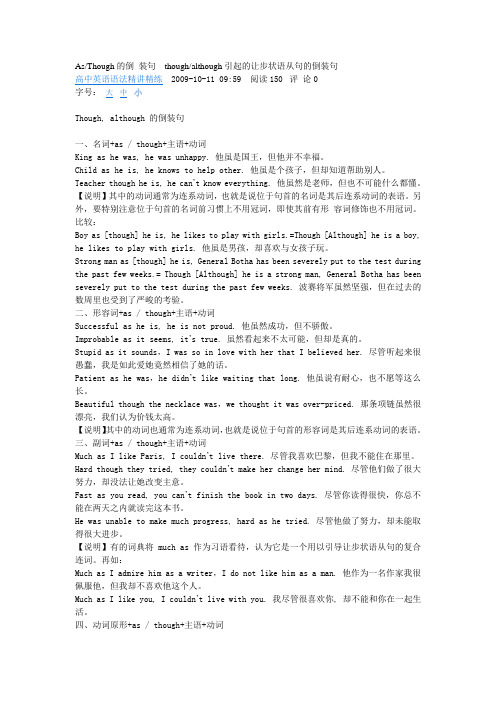
As/Though的倒装句---though/although引起的让步状语从句的倒装句高中英语语法精讲精练2009-10-11 09:59 阅读150评论0字号:大中小Though, although 的倒装句一、名词+as / though+主语+动词King as he was, he was unhappy. 他虽是国王,但他并不幸福。
Child as he is, he knows to help other. 他虽是个孩子,但却知道帮助别人。
Teacher though he is, he can’t know everything. 他虽然是老师,但也不可能什么都懂。
【说明】其中的动词通常为连系动词,也就是说位于句首的名词是其后连系动词的表语。
另外,要特别注意位于句首的名词前习惯上不用冠词,即使其前有形容词修饰也不用冠词。
比较:Boy as [though] he is, he likes to play with girls.=Though [Although] he is a boy, he likes to play with girls. 他虽是男孩,却喜欢与女孩子玩。
Strong man as [though] he is, General Botha has been severely put to the test during the past few weeks.= Though [Although] he is a strong man, General Botha has been severely put to the test during the past few weeks. 波赛将军虽然坚强,但在过去的数周里也受到了严峻的考验。
二、形容词+as / though+主语+动词Successful as he is, he is not proud. 他虽然成功,但不骄傲。
让步状语从句倒装的句型(二)

让步状语从句倒装的句型(二)四、动词原形+as / though+主语+动词Object as you may, I’ll go. 纵使你反对,我也要去。
Try as he might, he couldn’t solve the problem. 尽管他想方设法,却未解决这个问题。
Search as they would, they would find nobody in the house. 无论怎样搜查,他们在房子里仍然没有找到一个人。
Dislike him as we may, we must acknowledge his greatness. 尽管我们不喜欢他,但必须承认他的伟大。
Lose money as I did, we got a lot of experience. 钱虽然丢了,我们却得到了许多经验。
Fail in the election as he did, he became famous for his fiery speech against slavery. 尽管落选了,但他却以其反对奴隶制的激烈演说而出了名。
【说明】主语后的动词通常为may, might, would, did 等情态动词或助动词(若表示情态意义,则选用情态动词;若陈述事实,则用did, do 等助动词)。
五、分词+as / though+主语+动词Raining hard as it is, I’m going out for a walk. 虽然正在下着大雨,我还是要出去散步。
Surrounded as we were by the enemy, we managed to march forward. 虽然我们被敌人包围着,但我们还是设法前进了。
Munching the a pple as he was, he had got an eye for all John’s movements. 他尽管在一个劲地嚼着苹果,但仍警惕着约翰的一举一动。
倒装句
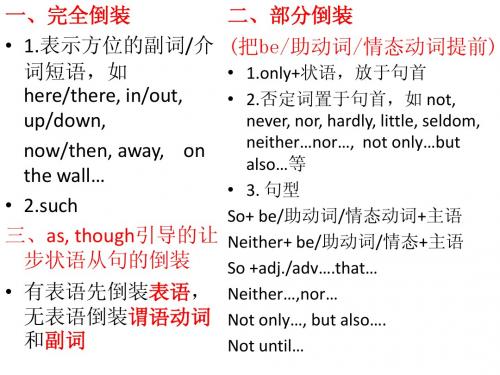
• 3. 句型 So +adj./adv….that… • Beijing offers so much of interest that most visitors simply run out of time before seeing it all. So much of interest does Beijing offer that most visitors simply run out of time before seeing it all. Not until… • We didn’t have supper until my father returned. Not until my father returned did we have supper. • He can’t fall asleep until 4:00 in the morning. Not until 4:00 in the morning can he fall asleep.
三、as, though引导的让步状语从句中的倒装 引导的让步状语从句中的倒装 • Although/Though it may seem strange, nobody was injured in the accident. Strange as/though it may seem,… • Although/Though he is a child, he knows a lot. Child as he is, … • Though he tries, he won’t succeed. Try as he does, he won’t succeed.
用倒装句翻译下列句子。
• • • • • 1.我从未去过美国。 2.只有通过这种方式才能学好英语。 3.我们学校位于大石河的东侧。 4.尽管他只是个孩子,可他必须要自己谋生。 4. 5. 直到开始工作,我才意识到我浪费了多 少时间。
让步状语从句的几类倒装句

让步状语从句的几类倒装句让步状语从句中的倒装编辑:彭秋义为了帮助同学们全面掌握让步状语从句的倒装用法,本文将这类语法现象归纳为以下五种句型:一、名词+as / though+主语+动词1. Queen as I am, I often feel unhappy . (虽然我是王后,但是我不开心)2. Child as my son is, he knows to help me. 我儿子虽是个孩子,但却知道帮我。
Teacher though I am , I can't know everything. 我虽然是老师,但也不可能什么都懂。
【说明】其中的动词通常为连系动词,也就是说位于句首的名词是其后连系动词的表语。
另外,要特别注意位于句首的名词前习惯上不用冠词,即使其前有形容词修饰也不用冠词。
比较:1.Boy as [though] he is, he likes to play with girls.=Though [Although] he is a boy, he likes to play with girls.他虽是男孩,却喜欢与女孩子玩。
2.Strong man as [though] he is, he has been severely putto the test during the past few weeks.= Though [Although] he is a strong man, General Botha has been severely put tothe test during the past few w eeks. 他虽然坚强,但在过去的数周里也受到了严峻的考验。
二、形容词+as / though+主语+动词1.Successful as he is, he is not proud. 他虽然成功,但不骄傲。
2.Improbable as it seems, it's true. 虽然看起来不太可能,但却是真的。
英语语法之倒装句
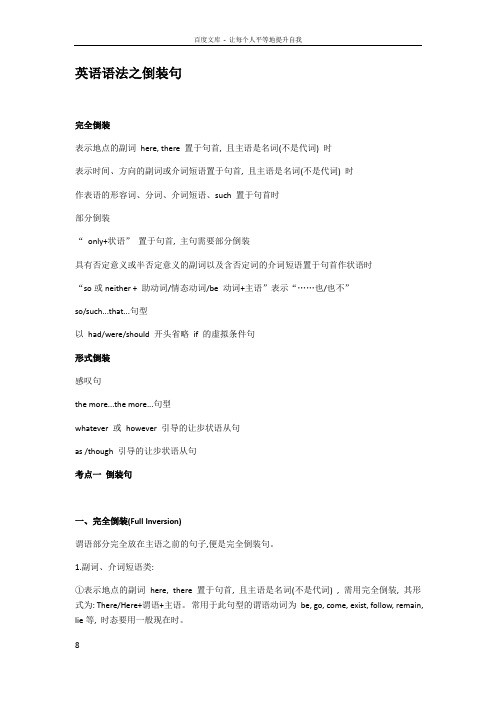
英语语法之倒装句完全倒装表示地点的副词here, there 置于句首, 且主语是名词(不是代词) 时表示时间、方向的副词或介词短语置于句首, 且主语是名词(不是代词) 时作表语的形容词、分词、介词短语、such 置于句首时部分倒装“only+状语”置于句首, 主句需要部分倒装具有否定意义或半否定意义的副词以及含否定词的介词短语置于句首作状语时“so或neither + 助动词/情态动词/be 动词+主语”表示“……也/也不”so/such...that...句型以had/were/should 开头省略if 的虚拟条件句形式倒装感叹句the more...the more...句型whatever 或however 引导的让步状语从句as /though 引导的让步状语从句考点一倒装句一、完全倒装(Full Inversion)谓语部分完全放在主语之前的句子,便是完全倒装句。
1.副词、介词短语类:①表示地点的副词here, there 置于句首, 且主语是名词(不是代词) , 需用完全倒装, 其形式为: There/Here+谓语+主语。
常用于此句型的谓语动词为be, go, come, exist, follow, remain, lie等, 时态要用一般现在时。
There goes the last bus.末班公共汽车开走了。
Here is the address of your hotel.这里就是你宾馆的地址。
There goes the bell for break.下课铃响了。
Here you are.给你。
(代词作主语, 不倒装)②表示时间的副词(如: now, then 等) 、运动方向的副词(如:out, in, up, down, away 等) 及表示地点的介词短语置于句首, 且主语是名词(不是代词) , 需用完全倒装, 其形式为: 副词或介词短语+谓语+主语。
常用于此句型的谓语动词为come, fall, follow,exist, lie, go, remain, run 等, 时态为一般现在时或一般过去时。
英语倒装句的九种分类讲解

英语倒装句的九种分类讲解为了强调或平衡句子结构,英语中常用倒装;倒装有全部倒装和部分倒装;全部倒装是指将句子中的谓语动词全部置于主语之前;部分倒装是指将谓语的一部分如助动词或情态动词置于主语之前;如果句中的谓语没有助动词或情态动词,则需添加助动词do,does或did等,并将其置于主语之前;现将倒装句分类讲解如下:1. 以here,there,now,then等地点或时间副词开头的句子,谓语动词是be, co me, go, remain等,而主语又是名词时,用全部倒装;注意:如果句子的主语是代词时,则不倒装;如:Here comes the bus/ Here it comes2. 有些动词与副词out,in,up,down,away等构成不及物动词短语;为了使句子更生动,常将这些副词提前到句首,这时用全部倒装;注意:句子的主语是代词时,则不倒装;如:Up went the rocket. / Up it went.3. 将表示地点的介词短语放在句首进行强调时,使用全部倒装;谓语动词常为不及物动词;如: From the window came the sound of music.4. 当句子主语部分较长,谓语部分较短,或为了强调句子的表语时,常使用全部倒装;句子的结构为“表语+系动词+主语”;如: Gone are the days when we had nothing to eat.5. if虚拟条件状语从句中,如果将连词if省略,需用部分倒装;如:Were I yo u, I would go there.6. as引导的让步状语从句的倒装有如下几种形式:1 从句的谓语部分为“不及物动词+副词”时,常将此副词提前到从句句首;如:Hard as you try, you will not succeed.2 从句的谓语部分为“情态动词+不及物动词”时,常将此动词提前到从句句首;如: Wait as you may, he will not see you.3 从句的谓语部分是“系动词+形容词”时,常将此表语形容词提前到从句句首;如: Proud as the nobles are, they are afraid to see me.4 从句的谓语部分是“系动词+单数名词”时,则常将这个表语提前,但要省略名词前的不定冠词;如: Child as he is, he can tell right from wrong.7. 具有半否定意义的词或短语位于句首时,用部分倒装;如:seldom, rarely, not, never, by no means, in no time, hardly...when, no sooner...than, n ot only...but also等;如: Not only does he do well in his lessons, but a lso he often helps others with their lessons.8. “only+状语”位于句首时, 用部分倒装;如:Only then did I know the importance of English.9. so...that结构中,有时要强调so所修饰的形容词或副词,常将so 连同它所修饰的形容词或副词一起提前放在句首;如: So bright was the moon that th e flowers seem as bright as by day.英语语法倒装句之部分倒装部分倒装是指将谓语的一部分如助动词或情态倒装至主语之前;如果句中的谓语没有助动词或情态动词,则需添加助动词do, does或did,并将其置于主语之前;1 句首为否定或半否定的词语,如no, not, never, seldom, little, hardly, at no time, in no way, not until… 等;Never have I seen such a performance.Nowhere will you find the answer to this question.Not until the child fell asleep did the mother leave the room.当Not until引出主从复合句,主句倒装,从句不倒装;注意:如否定词不在句首不倒装;I have never seen such a performance.The mother didn't leave the room until the child fell asleep.典型例题1 Why can't I smoke hereAt no time___ in the meeting-roomA. is smoking permittedB. smoking is permittedC. smoking is it permittedD. does smoking permit答案A. 这是一个倒装问题;当否定词语置于句首以表示强调时,其句中的主谓须用倒装结构; 这些否定词包括no, little, hardly, seldom, never, not only, not until等;本题的正常语序是 Smoking is permitted in the meeting-room at no time.2 Not until the early years of the 19th century ___ what heat is.A. man did knowB. man knowC. didn't man knowD. did man know 答案D. 看到Not until…的句型,我们知道为一倒装句,答案在C,D 中选一个; 改写为正常语序为,Man did not know what heat is until the early years o f the 19th. 现在将not提前,后面就不能再用否定了,否则意思就变了;倒装句讲解和练习英语句子通常有两种语序:一种主语在前,谓语在后,称为自然语序,另一种谓语在前,主语在后,称为倒装语序按“主语+ 谓语” 这种顺序排列的句子是陈述语序;如果排列顺序变为“谓语或谓语一部分+主语”,就是倒装;倒装句分为:一、部分倒装就是把谓语中的be动词、助动词或情态动词置于主语前面;常见于下列几种情况:一. only所修饰的副词,介词短语或状语从句放在句首时,要用:only+ 状语+ be /助动词/情态动词+主语及其他Only when he told me the news did I know what had happened.Only in this way can you make progress in your Eng lish.注意:only修饰主语时,不需要倒装;in this way ________to make improvement in the op erating system.A. you can hopeB. you did hopeC. can you hopeD. did you hope二.含有否定意义的副词或连词放在句首时;如:never, l ittle, seldom, not, not only, not until, no sooner …than, hardly …when, rarely, scarcely, in no way等;We seldom get up at four in the morning.= Seldom do we get up at four in the morning.Not a single word from him could the enemy drag.Rarely have I heard of such a silly thing.1hardly…when; scarcely…when…; no sooner…than…可以用正常语序 had hardly done when… did 或用倒装句式Hardly had + 主语+ done when… did 句式;hardly所在的句子用过去完成时;The bell hardly had rung when the class began.= Ha rdly had the bell rung when the class began.No sooner had he arrived in Beijing than he began to work.2not only… but also 如连接两个成分时,不用倒装;连接句子时, 前面的句子要用倒装;Not only was everything that he had taken away fro m him, but also his German citizenship.Not only is he busy, but also I have a lot of work to do.Not only does he speak English very well, but also he speaks French well.2.I finally got the work I dreamed about. Never i n all my life________ so happyA. did I feelB. I feltC. I had feltD. had I fel t3.Not until I began to work ________how much time I had wasted.A. didn't I realizeB. did I realizeC. I didn't r ealizeD. I realized4.No sooner___ than it began to rain heavily.A. the game beganB. has the game begunC. did the game beginD. had the game begun三.在so…that, such…that句型中,若把so, such引导的结构放在句首时;So frightened was he that he did not dare to move an inch.5.So difficult _____it to live in an English-spea king country that I was determined to learn English well.A. I've felt B have I felt C. I did feel D. did I feel四.省略了if的虚拟条件句中,把were, had或should放在句首时;If I were you, I would take the job. = Were I you, I would take the job.6.________it rain tomorrow, we would have to put off the visit to Yangpu Bridge.A. WereB. ShouldC. WouldD. Will五.把副词so放在句首,表示前面所说的情况也适用于另一个人或物;I like reading English, so does he.六.把neither, nor放在句首,表示前面的否定内容也适用于另一个人或物;If you won't go, neither will I.don't think I can walk any further.-________, let's stop here for a rest.A. Neither and IB. Neither can IC. I don't think soD. I think so七用于形容词/副词/名词/动词+as though引导的让步状语从句中;注意:当表语为名词时,则名词前不加任何冠词;主谓并不倒装;Try hard as he will, he never seems able to do the work satisfactorily.Child as he is, he knows a lot.8.________, I have never seen anyone who's as cap able as John.A. As long as I have traveledB. Now that I have traveled so muchC. Much as I have traveledD. As I have traveled so much八.由however, no matter how引导的让步状语从句中,把however+形容词/副词,no matter how+形容词/副词放在句首时;9.________, mother will wait for him to have dinn er together.A. However late is heB. However he is lateC. However is he lateD. However late he is二、全部倒装就是把整个谓语部分放在主语之前;注意:谓语动词的数要与后面的主语保持一致;常见于几种情况:一.用于地点副词here, there,方位副词out, in, up, d own及时间副词now, then等开头的句子里,以示强调;There goe s the bell.Look Here they come.这种倒装要求:主语必须是名词;主语是人称代词时,主语和谓语语序不变;Here it is.Away he went.这类倒装句式一般只用一般现在时和一般过去时;Here comes the bus.Out rushed the boys.二.当表示地点的介词短语放句首时;注意:谓语多为be, lie, sit, stand, come, w alk等不及物动词;倒装时不需要助动词;Under the table are three white cats.In front of the tower flews a stream.10.Under a big tree ________, half asleep.A. did sat a fat manB. a fat man satC. did a fat man satD. sat a fat man三there放在句首时,要用倒装句式;在“there + be”结构中的谓语动词有时不用be , 而用表示类似“存在”观念的其他不及物动词;如:live, stand, come, lie, flow, enter, rise 和appear等;There came shouts for help from the river.There lies a large wheat field in front of the house.Many years ago there lived an old man in the wooden house.四.表语置于句首时,倒装结构为"表语+系动词+主语";1形容词+系动词+主语Present at the meeting was Mr. Green, a headmaster.2过去分词+系动词+主语Hidden behind the door were some naughty children.Gone forever are the days when the Chinese people had to use foreign oil.3介词短语+系动词+主语In front of the playground is a newly-built house.五.有时由于主语较长,谓语很短,为保持句子平衡,或为了强调表语或状语,或使上下文紧密衔接时;They arrived at a house, in front of which sat an old man.六.在一些表示祝愿的句子里;Long live the Communist Party of ChinaMay you all be happy.答案 1—5 CDBDD 6—10 BBCDD巩固练习and caught the mouse.A. Up the cat jumpedB. The cat up jumpedC. Up jumped the catD. Jumped up the catand the lesson began.A. In came Mr BrownB. Mr Brown in cameC. In came heD. came in Mr Brown3. Over _______ , dead.A. rolling the goatB. rolled the goatC. did the goat rollD. the goat rolled4.—Where is my shirt, mum—_________.A. There is itB. There it isC. There isD. Here is it5. —Where is your father—Oh, ________.A. here he comesB. he here comesC. here does he comeD. here comes he6. The door opened and there ________ .A. enters an old manB. entered an old manC. did an old man enterD. an old man entered7. Now ______ your turn to recite the text.A. will comeB. comesC. has comeD. there is8. Often _____ them not to smoke here.A. we advisedB. advised meC. did we adviseD. had we advisedplaying soldiers.A. Inside the room were two boysB. Inside the room two boysC. Were two boys inside the roomD. Inside the room was two boys10. On the wall _______ two large portraits.A. are hangingB. hangedC. hangD. hangswho was wounded in the stomach.A. Among them were a soldierB. Among them was a soldierC. Among them a soldier wasD. Among they was a soldier12. Next door to ours ________ , who is no less than eighty.A. that lives an old manB. does an old man liveC. lives an old manD. where lives an old manplays the piano very well, ______.A. so every one of us doesB. every one of us doesC. so does every one ofusD. so do every one of ussay he works hard, ______, and _____.A. so he does; so you doB. so he does; so do youC. so does he; so do youD. so does he; so you do15. —I thought you women were present at the meeting.—__________.A. So we wereB. So we didC. So were weD. So did wedon’t think Jack will come today, _____.A. nor will MaryB. and Mary doesn’tC. Mary will eitherD. or Mary does17. She is fond of cooking, _____I .A. so amB. nor amC. neither doD. nor dowas born in Germany and German was his native language .A. So it was with AnglesB. So was it with AnglesC. So was AnglesD. So did Anglesfish needs water and without water it will .A. So does a manB. So will a manC. So it is with a manD. So is it with a man20. So absorbed _______ the work that she often forgot to _____ her meals.A. had she been in; doB. she was in; makeC. was she in; takeD. she had been in ; haveloudly ______ that every one of the class could hear him.A. did he speakB. did he spokeC. spoke heD. he spoke22. __________ his appearance that no one could recognize him.A. Strange so wasB. So strange wasC. Was so strangeD. So was strangeonce ______ their plan.A. did they changeB. they changedC. changed theyD. they did change24. Never ______ such a wonderful place as Hangzhou.A. are seeingB. had I seenC. I have seenD. have I seen______ TV during the day.A. they watchB. are they watchingC. have they watchedD. do they watch______ as in my garden.A. the flowers were so beautifulB. were the flowers so beautifulC. so beautiful were the flowersD. so beautiful the flowers were27. Hardly ________ his homework when he went out.A. finished heB. he had finishedC. did he finishD. had he finished_____ finished their homework ______ I came into the classroom.A. had they; than B. they had; whenC. had they; when D. did they; when29. Not only _______ a promise, but als o he kept it.A. has he made B. does he makeC. he made D. did he make30. Not until his comra des criticized him _______ to admit his mistake.A. had he begun B. began heC. did he begin D. doe s he begin答案 1—5 CABBA 6—10 BBBDA 11—15 BCCBA 16—20 BAACC 21—25 ABADD 26—30 BDCDC。
英语倒装句

关于让步倒装所谓让步倒装,主要指的是由as或though引出的倒装形式的让步状语从句。
这类倒装句置于句首的可以是形容词、副词、动词或名词等。
如:Successful as [though] he is, he is not proud. 他虽然成功,但不骄傲。
Cold as [though] it was, they went on working. 尽管天气很冷,他们仍不停地工作。
Much as [though] I’d like to, I can’t join you for lunch. 尽管我很想,但我不是不能与你们一起吃午饭。
Hard though [as] they tried, they couldn't make her change her mind. 尽管他们做了很大努力,却没法让她改变主意。
Try as [though] he may, he will not pass the examination. 尽管他可能会努力,他不会通过考试。
Search as [though] they would, they would find nobody in the house. 无论怎样搜查,他们在房子里仍然没有找到一个人。
Boy as [though] he was, he behaved like a girl. 他虽是个男孩,但举止却像个女孩。
注意,这类虚拟倒装有以下语法特点:1. 当置于句首的名词是单数可数名词时,其前不能用冠词,即使名词前有形容词修饰也是如此。
如:Big puzzle as [though] it was, it hadn’t got the better of Jim. 虽然是个大难题,但仍没有难倒吉姆。
2. 这类让步倒装句式用as或though均可,总的说来,as比though更普通,但是不能用although。
3. 用although不可倒装,用though时,也可以不倒装;而用as时,必须倒装。
四级考试语法结构测试重点--(特殊)倒装结构-四级语法
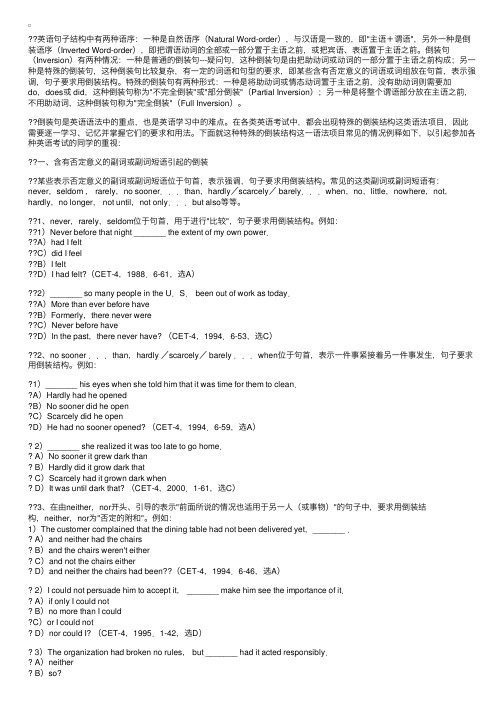
英语句⼦结构中有两种语序:⼀种是⾃然语序(Natural Word-order),与汉语是⼀致的,即"主语+谓语",另外⼀种是倒装语序(Inverted Word-order),即把谓语动词的全部或⼀部分置于主语之前,或把宾语、表语置于主语之前。
倒装句(Inversion)有两种情况:⼀种是普通的倒装句---疑问句,这种倒装句是由把助动词或动词的⼀部分置于主语之前构成;另⼀种是特殊的倒装句,这种倒装句⽐较复杂,有⼀定的词语和句型的要求,即某些含有否定意义的词语或词组放在句⾸,表⽰强调,句⼦要求⽤倒装结构。
特殊的倒装句有两种形式:⼀种是将助动词或情态动词置于主语之前,没有助动词则需要加do,does或 did,这种倒装句称为"不完全倒装"或"部分倒装"(Partial Inversion);另⼀种是将整个谓语部分放在主语之前,不⽤助动词,这种倒装句称为"完全倒装"(Full Inversion)。
倒装句是英语语法中的重点,也是英语学习中的难点。
在各类英语考试中,都会出现特殊的倒装结构这类语法项⽬,因此需要逐⼀学习、记忆并掌握它们的要求和⽤法。
下⾯就这种特殊的倒装结构这⼀语法项⽬常见的情况例释如下,以引起参加各种英语考试的同学的重视:⼀、含有否定意义的副词或副词短语引起的倒装某些表⽰否定意义的副词或副词短语位于句⾸,表⽰强调,句⼦要求⽤倒装结构。
常见的这类副词或副词短语有:never,seldom , rarely,no sooner...than,hardly/scarcely/ barely...when,no,little,nowhere,not,hardly,no longer, not until,not only...but also等等。
1、never,rarely,seldom位于句⾸,⽤于进⾏"⽐较",句⼦要求⽤倒装结构。
倒装句
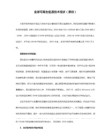
3)Here he comes.
(7)以关联词so (…that)开头的句子中,句子须倒装。例如:
1)So small was the mark that I could hardly see it.
2)So quickly did the workmen finish their work that they were given a bonus.
例:I know nothing about this river,neither how long,how wide nor how deep it is.(我一点也不了解这条河,不知道它有多长,多宽或多深。)
7) 由as引导的部分倒装句:
a) 当as作为比较意义时,即用于as + adj./ adv. + as结构中时,如果把第一个as省略掉,就形成部分倒装句。
4)一些如scarcely……when,no sooner ……than,hardly……when引导的主从复合句主句要求使用过去完成式。 注意:在部分倒装句中,只有助动词、情态动词或连系动词to be可以置于主语之前,其它部分都要置于主语之后。
5)此外,一些介词+no+名词的结构中需要用部分倒装,这些结构包括at no time; by no means; by no manner of means; for no reason; in no case; in/under no circumstances; in no sense; in no way; on no account; on no consideration; at no point例如Under no circumstances should you lend Paul any money. 注意:
英语语法大全之让步状语从句

英语语法大全之让步状语从句让步状语从句though, although注意:当有though, although时,后面的从句不能有but,但是though 和yet可连用Although it's raining, they are still working in the field.虽然在下雨,但他们仍在地里干活。
He is very old, but he still works very hard.虽然他很老,但仍然努力地工作。
Though the sore be healed, yet a scar may remain.伤口虽愈合,但伤疤留下了。
(谚语)典型例题1)___she is young, she knows quite a lot.A. WhenB. HoweverC. AlthoughD. Unless答案:C。
意为虽然她很年轻,却知道许多。
2)as, though 引导的倒装句as / though引导的让步从句必须表语或状语提前(形容词、副词、分词、实义动词提前)。
Child as /though he was, he knew what was the right thing to do.= Though he was a small child, he knew what was the right thing to do.注意:a.句首名词不能带任何冠词。
b.句首是实义动词,其他助动词放在主语后。
如果实义动词有宾语和状语,随实义动词一起放在主语之前。
Try hard as he will, he never seems able to do the work satisfactorily.= Though he tries hard, he never seems…虽然他尽了努力,但他的工作总做的不尽人意。
3)ever if, even though.即使We'll make a trip even though the weather is bad.4) whether…or-不管……都Whether you believe it or not, it is true.5)"no matter +疑问词" 或"疑问词+后缀ever"No matter what happened, he would not mind.Whatever happened, he would not mind.替换:no matter what = whateverno matter who = whoeverno matter when = wheneverno matter where = whereverno matter which = whicheverno matter how = however注意:no matter 不能引导主语从句和宾语从句。
thoughalthough引起的让步状语从句的倒装句

∙Though, althou gh 的倒装句∙As/Though的倒装句---though/although引起的让步状语从句的倒装句一、名词+as / though+主语+动词King as he was, he was unhapp y. 他虽是国王,但他并不幸福。
Childas he is, he knowsto help other.他虽是个孩子,但却知道帮助别人。
t hing.他虽然是老师,但也不可能什么都懂。
Teache r though he is, he can’t know every【说明】其中的动词通常为连系动词,也就是说位于句首的名词是其后连系动词的表语。
另外,要特别注意位于句首的名词前习惯上不用冠词,即使其前有形容词修饰也不用冠词。
比较:.=Though[Althou gh] he is a boy, he likesto play Boy as [though] he is, he likesto play with girlswith girls.他虽是男孩,却喜欢与女孩子玩。
g the past few Strong man as [though] he is, Genera l Bothahas been severe ly put to the test duringe ly put to the test durin weeks.= Though[Althou gh] he is a strong man, Genera l Bothahas been sever.波赛将军虽然坚强,但在过去的数周里也受到了严峻的考验。
the past few weeks二、形容词+as / though+主语+动词Succes sfulas he is,he is not proud.他虽然成功,但不骄傲。
倒装句之形式倒装(高考必备)

倒装句之形式倒装一、什么是“形式倒装”?跟完全倒装和部分倒装不同的是,形式倒装只是把要强调的内容放在句首,主谓不用倒装。
二、形式倒装的几种常见句型1.as/though(尽管)引导的让步状语从句的倒装将需要强调的表语(名词、形容词)、部分谓语动词、副词提前到as/though 的前面,主谓语序不变。
Tired though he was, he still went on with his work.他尽管累,却依然继续工作。
Search as they would here and there, they could find nothing in the room.尽管到处寻找,但他们在房间里找不到任何东西。
Hard as I studied, I could not catch up with them.我虽然努力学习,但赶不上他们。
注意:如果是单数名词或形容词的最高级作表语,提前的时候不再用冠词。
下面我们一起来做题:例题1:, you need to be failing more if you are expected to succeed in the end.(2018 南京高三一模)A. Strange as might it seemB. As it might seem strangeC. As strange it might seemD. Strange as it might seem解题步骤:第一步:as 引导让步状语从句需要形式倒装→ 排除B、C第二步:形式倒装的语序:主谓并不倒装→ 排除 A → 答案 D例题2:—, General Winston has been severely put to the test during the past few weeks.(2015 盐城摸底)A. A strong man as he isB. Strong man though he isC. A strong man as is heD. Strong man as is he解题步骤:第一步:形式倒装主谓不倒装→ 排除C、D第二步:前置去冠词→ 答案 B2.what/how 引导的感叹句对名词或名词短语感叹时,用what 引出;对形容词或副词感叹时,用how 引出。
高中英语倒装用法归纳

高中英语倒装用法归纳倒装结构也是英语高考中常考的语法现象,该结构分为完全倒装和部分倒装。
所谓完全倒装是指整个谓语部分放在主语前面;而部分倒装是指谓语的一部分(情态动词或助动词)放在主语之前。
一、完全倒装结构㈠there be句型,引导词there 还可以接appear, exist, lie, remain, seem, stand, live 等词。
①There is a mobile phone and some books on the desk. 桌上有一个手机和一些书。
②There are thousands of people gathering on the square. 广场上聚集着成千上万的人③There lived an old fisherman in the village. 村里住着一位老渔夫。
④There stand two white houses by the river. 河滨矗立着两座白房子。
⑤There existed some doubt among the students. 学生中有些怀疑。
㈡用于here, there, now, thus, then +动词+主语的句型中(谓语动词多为be, go, come等)。
①Here comes the bus.汽车来了。
②There goes the bell. 铃响了。
③Now comes my turn. 轮到我了。
④Then came the order to take off. 起飞的命令到了。
㈢以out, in, up, down, off, away等副词开头,谓语动词是表示“移动”的意思。
如:go, come, leave等。
①Away went the crowd one by one. 人们一个一个地离去。
②In came a stranger in black. 进来了一位穿黑衣的陌生人。
- 1、下载文档前请自行甄别文档内容的完整性,平台不提供额外的编辑、内容补充、找答案等附加服务。
- 2、"仅部分预览"的文档,不可在线预览部分如存在完整性等问题,可反馈申请退款(可完整预览的文档不适用该条件!)。
- 3、如文档侵犯您的权益,请联系客服反馈,我们会尽快为您处理(人工客服工作时间:9:00-18:30)。
请看下面一道考题:
______, he talks a lot about his favorite singers afterclass.
A. A quiet student as he may be
B. Quiet student ashe may be
C. Be a quiet student as he may
D. Quiet as he maybe a student
这道题很有一定难度。
具体说来,它主要涉及两个考点:一是让步状语从句倒装后的词序问题。
让步状语从句之所以要采用倒装结构,主要是为了强调位于句首的名词、形容词、副词、动词等,其词序形式为:被强调的成分+as /though + 主语+动词。
二是在倒装的让步状语从句中,位于句首的单数可数名词是否带冠词的问题。
按照英语习惯,英语中的单数可数名词在泛指时,一般要有不定冠词的修饰,但是位于倒装让步状语从句句首的单数可数名词是个例外,即使泛指其前也不加不定冠词。
由此可知,上面这道考题的答案应为B。
为了帮助同学们全面掌握让步状语从句的倒装用法,本文将这类语法现象归纳为以下五种句型:
一、名词+as / though+主语+动词
King as he was, he was unhappy. 他虽是国王,但他并不幸福。
Child as he is, he knows to help other. 他虽是个孩子,但却知道帮助别人。
Teacher though he is, he can't know everything. 他虽然是老师,但也不可能什么都懂。
【说明】其中的动词通常为连系动词,也就是说位于句首的名词是其后连系动词的表语。
另外,要特别注意位于句首的名词前习惯上不用冠词,即使其前有形容词修饰也不用冠词。
比较:
Boy as [though] he is, he likes to play with girls.=Though [Although] he is a b oy, he likes toplay with girls.他虽是男孩,却喜欢与女孩子玩。
Strong man as [though] he is, General Botha has been severely put to the tes t during the pastfew weeks.= Though [Although] he is a strong man, General Botha has been severely put tothe test during the past few weeks.
波赛将军虽然坚强,但在过去的数周里也受到了严峻的考验。
二、形容词+as / though+主语+动词
Successful as he is, he is not proud.
他虽然成功,但不骄傲。
Improbable as it seems, it's true.
虽然看起来不太可能,但却是真的。
Stupid as it sounds, I was so in love with her that I believed her.
尽管听起来很愚蠢,我是如此爱她竟然相信了她的话。
Patient as he was, he didn't like waiting that long.
他虽说有耐心,也不愿等这么长。
Beautiful though the necklace was, we thought it was over-priced.
那条项链虽然很漂亮,我们认为价钱太高。
【说明】其中的动词也通常为连系动词,也就是说位于句首的形容词是其后连系动词的表语。
三、副词+as / though+主语+动词
Much as I like Paris, I couldn't live there. 尽管我喜欢巴黎,但我不能住在那里。
Hard though they tried, they couldn't make her change her mind.
尽管他们做了很大努力,却没法让她改变主意。
Fast as you read, you can't finish the book in two days.
尽管你读得很快,你总不能在两天之内就读完这本书。
He was unable to make much progress, hard as he tried.
尽管他做了努力,却未能取得很大进步。
【说明】有的词典将much as 作为习语看待,认为它是一个用以引导让步状语从句的复合连词。
再如:
Much as I admire him as a writer, I do not like him as a man.
他作为一名作家我很佩服他,但我却不喜欢他这个人。
Much as I like you, I couldn't live with you.
我尽管很喜欢你, 却不能和你在一起生活。
四、动词原形+as / though+主语+动词
Object as you may, I'll go.
纵使你反对,我也要去。
Try as he might, he couldn't solve the problem.
尽管他想方设法,却未解决这个问题。
Search as they would, they would find nobody in thehouse.
无论怎样搜查,他们在房子里仍然没有找到一个人。
Dislike him as we may, we must acknowledge hisgreatness.
尽管我们不喜欢他,但必须承认他的伟大。
Lose money as I did, we got a lot of experience.
钱虽然丢了,我们却得到了许多经验。
Fail in the election as he did, he became famous for his fiery speech against slavery. 尽管落选了,但他却以其反对奴隶制的激烈演说而出了名。
【说明】主语后的动词通常为may, might, would, did 等情态动词或助动词(若表示情态意义,则选用情态动词;若陈述事实,则用did, do 等助动词)。
五、分词+as / though+主语+动词
Raining hard as it is, I'm going out for a walk. 虽然正在下着大雨,我还是要出去散步。
Surrounded as we were by the enemy, we managed to march forward.
虽然我们被敌人包围着,但我们还是设法前进了。
Munching the apple as he was, he had got an eye for all John's movements. 他尽管在一个劲地嚼着苹果,但仍警惕着约翰的一举一动。
【三条补充说明】
1. 这类倒装的让步状语从句可用as, though 来引导,但不能用although来引导;但是,未倒装的让步状语从句则可用though, although来引导,而不能用as来引导。
也就是说,although引导让步状语从句时不能倒装,as引导让步状语从句时必须倒装,而though
引导让步状语从句时可以倒装也可以不倒装。
如:
虽然很晚了,但我们还是继续工作。
正:Late as [though] it was, we still went on working.
正:Though [Although] it was late, we still went on working.
误:Late although it was, we still went on working.
误:As it was late, we still went on working.
2. 上面提到的倒装结构有时也可用来表示原因,区别的办法主要看句子的内容:让步从句的内容大多数与主句在意义上相反,而原因从句则与主句之间有因果关系。
比较:
Tired as he was, he sat up late studying at night.
昨晚他虽然很疲倦了,但还是学习到很晚才睡。
(表让步)
Tired as he was, he went to bed early.
因为很累,所以他睡得很早。
(表原因)
Young as he was, he was equal to the task.
他虽年轻,却能胜任这项工作。
(表让步)
Young as he was, he was not equal to the task.
他因为年轻,所以不能胜任这项工作。
(表原因)
3. 在美国英语中,人们通常用as…as引导让步状语从句。
如:
Cold as it was, we went out.=As cold as it was, we went out.
尽管天气冷,我们还是出去了。
Successful as he is, he is not proud.=As successful as he is, he is not proud. 他虽成功了,但不骄傲。
